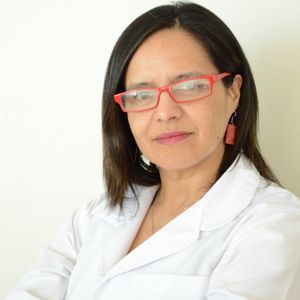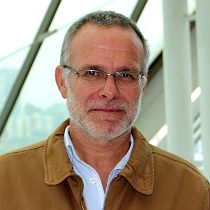
Pamela Jofré Pávez (Viña del Mar, 1970) Pediatrician, pediatric gastroenterologist and Master in Narrative Medicine, ISTUD, Milan. She has taught for 18 years Pediatrics at the University of Valparaiso. She currently directs the Laboratory of Narrative Medicine, under the School of Medicine of the UV.
Rodrigo Vergara Fisher (Vallenar, 1962) Pediatrician and infectologist. Academic for years in the chair of Pediatrics and Microbiology at the UV and former director of the School of Medicine of the same university.

What is the name of your organization/association/society/research group?
Laboratorio de medicina narrativa de la Universidad de Valparaíso. (Narrative Medicine Laboratory at Valparaíso University).

What is its story and history?
The Laboratory was created by an university decree in August 2018, to formally start academic activities with undergraduate students from the School of Medicine, and also, to generate a space for interdisciplinary exchange that allows the development of activities that connect narrative ideas with the community and with the university and social environment, where we are located, in Valparaíso, Chile.
Personally (Pamela) in 2011, given the multiple changes that medicine and its way of teaching had experienced, I considered that it was necessary to generate some change. After a reflective period and because of a search for ways to deal with this problem, I found that at Columbia University and, closer to us, at the Italian Hospital in Buenos Aires, a movement was emerging that sought to develop the humanist side of medical work, from education and health care.
I was excited by those ideas, so I trained in narrative medicine and developed personal work, until in 2017 I presented a project for the insertion of some activities of narrative medicine during the Pediatrics internship (last-year medical students). The authorities at that time (Dr. Gustavo Ríos, director of the Department of Pediatrics, as well as Dr. Rodrigo Vergara, director of the School of Medicine), supported the idea.
From then on, things went by themselves and we were able to move forward with new projects, adding wills and capacities in various fields: cinema, mindfulness, poetry, reflective writing and drawing, etc. And so it was finally possible to give life to the narrative medicine laboratory, which will be 5 years old in 2023.
What is its mission and its philosophy?
The mission of the laboratory within the health community is to be able to permeate our environment (educational, healthcare professionals and patients) with a narrative culture. In this sense, we seek that through the reflections that this methodology proposes, students and professionals have protected spaces to incorporate what happens when they contact their patients, when they have close experiences with suffering and death, with the care seen in the most broad sense.
Constantly rehearsing the look of the other and of themselves is a deliberate intention in our work with students. In the same sense, we develop some activities at the community level to transmit the experience that we are acquiring to professionals and people in general who adhere (or are interested to learn) to the narrative ideas in health.
Medicine’s relationship with society has been described as a social contract, in narrative medicine we constantly reflect with the students on the need to provide scientific and human quality care of the highest level, in our citizen role, simply as one more that we have to play.

How is it framed today?
Today our work continues to be focused principally on students, where we have been able to progressively advance in a greater number of curricular hours dedicated to narrative medicine within its academic framework and we maintain some elective courses in narrative medicine where students who wish to learn or deepen their narrative skills can enroll.
In addition, since 2017 we have been carrying out activities (meetings and conferences) towards the community and socio-health professionals. This year we started a course on health narrative skills for Spanish-speaking teachers and professionals. There we have students from Spain, Colombia, Argentina, Mexico and of course Chile.
Another activity that we are excited about, is being able to relate to the sanitary spaces (professionals and patients). A year ago, we made an alliance with the Publishing House of the University of Valparaíso (UV) and through a plan to promote reading that they already had, we were able to give life to spaces for narrative medicine in places of primary health care.
It was a precious job that we started with books donated by the publisher (UV) and we include health professionals who work directly with older people. Reflexive writing could be encouraged with various exercises framed in a development program for “narrative medicine facilitators”. We hope to continue working on that this year.
What are the main ongoing projects?
As for our educational work, we are making more and more incursions into preparing our narrative medicine sessions in other spaces such as art galleries and of course in municipal museums. We are very interested in consolidating these works, including new perspectives and the so-called visual thinking strategies or VTS, ready to serve narrative medicine.
In addition, we are preparing for the “Seventh Symposium of Narrative Medicine” that will take place in June 2024. They will be fully face-to-face and will have the presence of prominent panelists from Italy, Spain, France and Argentina. Along with this, we have widely disseminated the symposium, so that those groups that are working in the area of narrative medicine and the medical humanities in general can be present with conferences, research and educational innovations in this field.
What plans for the future?
It is part of the present, but without a doubt we look to the future and think that research is needed in the area of medical education and narrative medicine, as well as in the humanities for health. We are convinced, and the literature has shown it, that these tools are useful for students and professionals, and through them for patients and people, but it has become a necessity for us to have our own data and to be able to continue motivate the authorities and whoever be responsible for educational and health management, about the transcendence of narrative ideas in health work and principally in health professional students.
Where did the organization/association/society/group find resistance or difficulties (i.e. shortage of HCP, time pressure, EBM dogma…)?
The greatest resistance that we have seen comes from the initial ignorance that existed with the “narrative culture” in the field of health, but with the passage of time we have noticed an openness. Also, I think that professionals who spend many hours in clinical practice can see narrative medicine as an aesthetic ornament. For that reason, the change is more difficult and must be demonstrated with actions rather than words.
Until now, none of the professionals who work in the laboratory have abandoned their clinical work and it is necessary that it be so, because it is the source of inspiration for the work. We appear in front of the students as doctors, nurses, or clinical kinesiologists and also as teachers and narrative practice guides in interdisciplinary teams. They must see that everything adds to people’s health care and that the narrative and scientific brains are one.
